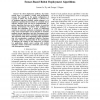Free Online Productivity Tools
i2Speak
i2Symbol
i2OCR
iTex2Img
iWeb2Print
iWeb2Shot
i2Type
iPdf2Split
iPdf2Merge
i2Bopomofo
i2Arabic
i2Style
i2Image
i2PDF
iLatex2Rtf
Sci2ools
124
click to vote
CDC
2010
IEEE
2010
IEEE
Sensor-based robot deployment algorithms
Abstract-- In robot deployment problems, the fundamental issue is to optimize a steady state performance measure that depends on the spatial configuration of a group of robots. For such problems, a classical way of designing high-level feedback motion planners is to implement a gradient descent scheme on a suitably chosen objective function. This can lead to computationally expensive algorithms that may not be adaptive to uncertain dynamic environments. We address these challenges by showing that algorithms for a variety of deployment scenarios in uncertain stochastic environments and with noisy sensor measurements can be designed as stochastic gradient descent algorithms, and their convergence properties analyzed via the theory of stochastic approximations. This approach yields often surprisingly simple algorithms that can accommodate complicated objective functions, and work without a detailed model of the environment. To illustrate the richness of the framework, we discuss two appli...
Related Content
| Added | 13 May 2011 |
| Updated | 13 May 2011 |
| Type | Journal |
| Year | 2010 |
| Where | CDC |
| Authors | Jerome Le Ny, George J. Pappas |
Comments (0)

